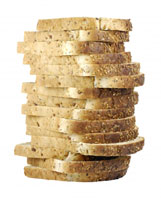
Image courtesy of Paul / FreeDigitalPhotos.net
The Competition Tribunal found Tiger Brands, Pioneer Foods and Foodcorp guilty of cartel conduct, paving the way for civil claims by those harmed.
The Children's Resource Centre, the Black Sash Trust, the Congress of South African Trade Unions and the National Consumer Forum brought an application for a class certification order to the Western Cape High Court. This was on behalf of consumers prejudicially affected by the anticompetitive conduct of bread producers.
The application was dismissed and they are now petitioning the Supreme Court of Appeal.
The organisations' legal representatives told the court on Wednesday that the money won in damage claims would be kept in a trust and distributed to feeding schemes. Any award by a court would not be distributed to the individual members of the class action group as the amounts were too small and the claims too many.
Judge Robert Nugent wanted to know how a court could say to plaintiffs that it acknowledged that they suffered losses, but then allow the money awarded to be given to someone else.
Willem van der Linde SC, appearing for consumers represented by the four organisations, said there had been instances where it was impossible or impractical to distribute awards to individual claimants. In cases like those, claims were distributed to suitable charities.
The court on Wednesday heard a certification application from the organisations. They claimed the poorest of the poor suffered losses because of the illegal conduct by Tiger Brands, Pioneer Foods and Premier Foods when they collectively decided to lower discounts to independent bread distributors, thereby increasing the price of bread.
Judge Nugent wanted to know why they bothered to define their action as a class if the members of the class would not benefit from the action.
Van der Linde said in cases where there had been an agreement by the members of the class the award could be distributed to a charitable cause.
Judge Nugent said was that not the case in the matter before the court. "Are they (bread producers) not just paying another penalty?" he asked.
Van der Linde conceded that there was an element of vindictiveness in class action.
Judge Malcolm Wallis said the damage had already been considered by the Competition Tribunal when it made its findings against the bread producers.
Van der Linde said parties could still file for damages, despite the fact that the companies had been fined by the tribunal. The organisations were bringing a certification application for two classes - consumers who purchased bread in the Western Cape from December 2006 until 14 February 2007 and a class of consumers who brought bread across the country from September 1999 up to 8 May 2008.
Tembeka Ngcukaitobi, appearing for the Legal Resources Centre which was admitted as a friend of the court, argued that if the bar was set too high and a certification application was elevated to a mini-trial, it would prevent people's access to justice.
Class action was a way of allowing people who, in the ordinary course of action, would not be able to have access to justice.
Judge Nugent said if the consumers in this case were denied access to justice it would make no difference to them at all, as they would not be benefiting from the action.
David Unterhalter SC, appearing for Premier Foods, said the application could not be successful as it did not demonstrate who suffered losses and their extent. The trust mechanism to distribute the claims was simply a device to remedy the failure of the applicants to show who the class was and what the damages it suffered amounted to.
Source: Business Day via I-Net Bridge

For more than two decades, I-Net Bridge has been one of South Africa’s preferred electronic providers of innovative solutions, data of the highest calibre, reliable platforms and excellent supporting systems. Our products include workstations, web applications and data feeds packaged with in-depth news and powerful analytical tools empowering clients to make meaningful decisions.
We pride ourselves on our wide variety of in-house skills, encompassing multiple platforms and applications. These skills enable us to not only function as a first class facility, but also design, implement and support all our client needs at a level that confirms I-Net Bridge a leader in its field.
Go to: http://www.inet.co.za